みんなさん、今晩は!
It’s been a long, long time since the last entry in this series…

…almost five years, to be precise. So what even is this? A little re-introduction is in order.
うみねこのなく頃に (When The Seagulls Cry) is a dōjin visual novel originally created by Ryukishi07 between 2007 and 2010—the sequel to Higurashi no Naku Koru Ni. It’s seen multiple versions since then on different platforms with replaced art, and gradually built up an international following.
How to describe it? Perhaps we could call it a blend of a mystery story, a metafictional fantasy, an epistemology lesson and a meditation on power and intergenerational trauma - as well as an absolute meme factory with its hammy dialogue and running catchphrases. It’s kind of great.
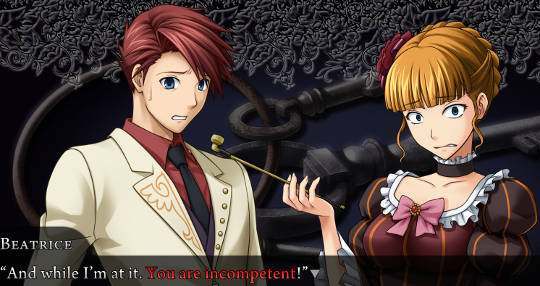
So, what about this series? Five years ago I began reading through the story and writing a running commentary where I tried to solve the mysteries, guess at what’s going on, make my own stupid jokes, give impressions and commentary, and occasionally go into wild tangents about philosophy of science.
It was great fun but I burned out and gradually lost track of where I had been.
Back then it seemed that many of you enjoyed this whole thing, and over the years people have occasionally asked me if I would continue it. The barrier to resuming was pretty huge: I ended up rereading the whole game up to the point I’d reached before. But now….. I’ve done it! Another 42,000 clicks and who knows how many hours, and I am once again up to speed on the state of Rokkenjima island midway through chapter 3.
Now, I am not really the same person who was liveblogging Umineko back in 2017. I’ve changed a lot (probably so have you~) Nevertheless, I hope I can continue to entertain - both those of you who already like Umineko and want to vicariously experience that first readthrough again, and people who are perhaps unlikely to ever read Umineko and want to get an idea of what the fuss is about.
I’ve also learned a lot more about Japan and the Japanese language in that time, which will be a big boon… particularly for our first order of business, which is going to hopefully be, finally solving the riddle of the gold. After all, if she could do it…
But first! Let’s set the scene for new readers! Here’s a recap of the situation as we currently understand it.
The story so far
Umineko takes place on an island called Rokkenjima, where the fabulously wealthy Ushiromiya family are holding an annual meeting. They are divided into three generations: the oldest is the family patriarch Kinzo; the generation below them consists of the adult siblings Krauss, Eva, Rudolf and Rosa, and their respective spouses Natsuhi, Hideyoshi and Kyrie; then making up the younger generation are the cousins Jessica, George, Battler and Maria.
The adults are caught in a fierce battle to divide up Kinzo’s inheritance, since they expect him to die any day now. The cousins are on much better terms, and broadly much less concerned with propriety (George notwithstanding!).
The Ushiromiyas are attended by a set of servants: adults Genji, Kumasawa and Gohda, and children Kanon and Sayo (Shannon). Genji, Kanon and Sayo are special, in that they are from an orphanage run by Kinzo, where they are taught to see themselves as his ‘furniture’ (家具)—a term which we’re increasingly seeing has a special occult meaning in this story, and it’s been suggested that these three are actually some kind of homunculi created by Kinzo. Finally, we have the family doctor Nanjo, one of the very, very few people who has the trust of Kinzo.
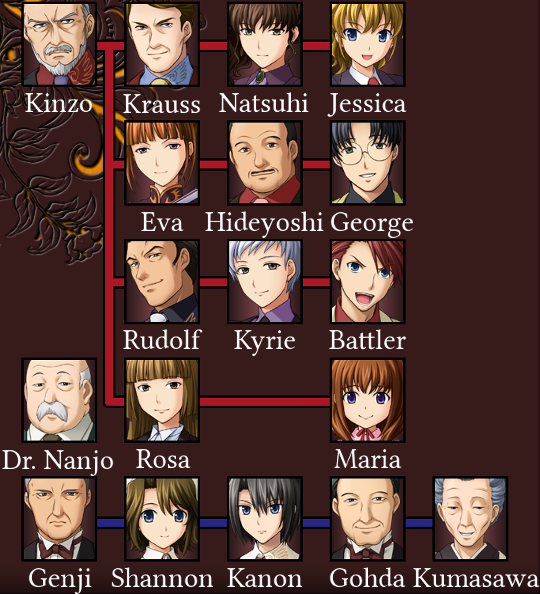
There are two crucial relationships between the Ushiromiya cousins and the servants. Notably, Sayo and George are a couple, and in every version of the events, George has presented her with a wedding ring. Jessica and Kanon also have feelings for each other, although they haven’t taken it nearly so far.
Kinzo has written a special riddle as, ostensibly, an epitaph to Beatrice, which points to the location of the hidden ten tons of gold - with the promise that anyone who finds the gold will succeed him as the head of the family with all the wealth that entails. We’ll discuss the riddle shortly.
In the first episode, we were introduced to the situation on Rokkenjima, and watched as almost all of these eighteen were slaughtered in a series of supernatural murders carried out—ostensibly!—by the Golden Witch, Beatrice, according to the terms of an elaborate ritual concocted by Kinzo to create a miraculous ritual and give him some small chance to see her again.
Exactly who Beatrice is forms one of the central mysteries of the plot, but so far we know: Kinzo is obsessed with her to the point of constantly intoning her name, and a legend states that she granted him ten tons of gold which formed the starting capital that grew into his present immense wealth. Recently, we have confirmed that there definitely was a person named Beatrice who lived in a hidden mansion on Rokkenjima, but she died while the Ushiromiya siblings were still children…
So, Beatrice killed nearly everyone. And nearly everyone was convinced she was indeed a powerful witch. But Battler—resurrected in Beatrice’s realm of Purgatory—refused to accept this, and insisted that witches do not exist and everything in the story happened by mundane means. This leads to the thrust of each episode of Umineko, each one a game played between Battler and Beatrice in which we watch a different way the events on Rokkenjima can play out.
The characters within the story are for the most part not aware of the existence of the time loop, but there are some exceptions, such as Kinzo, and Beatrice’s own avatar. Battler, in particular, can be divided into what I’ve been calling narrative!Battler (apparently the fan term is piece!Battler) and meta!Battler.
The rules of this game are far from clear, but we at least understand the main objective. Beatrice’s objective is to convince Battler that she is a witch, and Battler’s is to deny that witches and magic exist. But both sides have had additional goals: Battler wanted to ascribe the murders to an unknown nineteenth person rather than pin the blame on any of his family or friends, while Beatrice wants Battler to not merely acknowledge her existence, but submit and serve her.
In each game, we are presented with a narration of the events on Rokkenjima. The POV will sometimes be limited, sometimes quite broad. We have seen vivid displays of magic, but it’s been made clear that these should be regarded as unreliable: they are Beatrice’s narrative of what took place, and Battler has the right to contest them. However, what Battler cannot contest is whatever Beatrice says in red text, which must be regarded as an axiomatic truth. So we see events—typically murders—and Battler and Beatrice argue about whether or not they must have been done by magic.
In the second game, Battler was overwhelmed by the thought of casting doubt on his family members, and we saw Beatrice manifest to throw a huge cannibalistic demon party. We also saw Kinzo’s ‘furniture’ manifest magical abilities, such as swords and defensive bubbles. Battler surrendered and was made into a kind of human petplay situation by Beatrice, and back in Purgatorio, he had his body repeatedly smashed up by the Stakes of Purgatory. But with a little encouragement from Bernkastel, he got his fighting spirit back and went for another round.
So now, in the most recent episode, the magical version of events has gotten much, much more intricate—allegedly a result of Beatrice’s increasing power as she defeated Battler in the previous game.
Beatrice is attended by her own ‘furniture’—various magical servants, such as the Seven Stakes of Purgatory who resemble schoolgirls but can turn into deadly magical stakes, and now her butler Ronove who is ostensibly one of the 72 Goetic demons. Also present are two other witches with some interest in the game: Bernkastel and Lambdadelta, who both seem very young. And finally we have the new witch Virgilia, the prior holder of the name Beatrice: it seems that when the more familiar Beatrice was a child, she was taught magic by Virgilia.
Battler has been, with Virgilia’s coaching, holding his own in this game and getting a sense of the rules. But then things took a very unexpected turn.
So, the coronation of a new witch.
It seems that Eva Ushiromiya is a plural system, with an alter is a younger version of herself who we have come to understand qualifies as a ‘witch’. The two Evas were able to solve the riddle of the gold: it turns out the gold was hidden somewhere on Rokkenjima all along, and we got some major hints about the solution of the riddle. Eva discovered the gold, and was shortly followed by Rosa; while they discussed what to do with their discovery, we saw the younger Eva get crowned as a new Beatrice, with the former holder of the name becoming Beato.
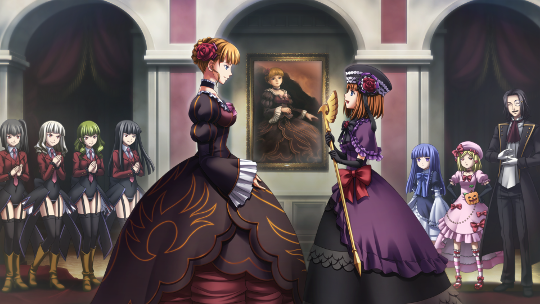
And that was where I left it.
We can observe a few other factors. Beato’s emotions always run close to the surface; she has quite a petulant and childlike demeanour. And while she’s still quick to boast and gloat, she’s been surprisingly affectionate and excitable towards Battler recently, especially when inviting him to give her a new name. And she seems quite unperturbed to cede her name status as Endless Witch to a new person. Meanwhile, it seems that Eva will have to perform the same series of murders to ‘resurrect’ and take form as Beato did, so the slaughter on Rokkenjima won’t end so easily!
We also have a general sense here that a ‘witch’ in the world of When They Cry is always something that used to be a person, and ascended to the status of witch by some yet unclear means. Whether all the witches began life as alters of someone else, or just Eva Beatrice, is also unclear—though it is notable that most of the witches are also children!
So, we’ve definitely received some hefty clues as to What Is Going On In All This. But it remains to parse them…
Let’s try and solve the bloody riddle, shall we? Once again, here is the riddle.
懐かしき、故郷を貫く鮎の川。
黄金郷を目指す者よ、これを下りて鍵を探せ。
川を下れば、やがて里あり。
その里にて二人が口にし岸を探れ。
そこに黄金郷への鍵が眠る。
鍵を手にせし者は、以下に従いて黄金郷へ旅立つべし。
第一の晩に、鍵の選びし六人を生贄に捧げよ。
第二の晩に、残されし者は寄り添う二人を引き裂け。
第三の晩に、残されし者は誉れ高き我が名を讃えよ。
第四の晩に、頭をえぐりて殺せ。
第五の晩に、胸をえぐりて殺せ。
第六の晩に、腹をえぐりて殺せ。
第七の晩に、膝をえぐりて殺せ。
第八の晩に、足をえぐりて殺せ。
第九の晩に、魔女は蘇り、誰も生き残れはしない。
第十の晩に、旅は終わり、黄金の郷に至るだろう。
魔女は賢者を讃え、四つの宝を授けるだろう。
一つは、黄金郷の全ての黄金。
一つは、全ての死者の魂を蘇らせ。
一つは、失った愛すらも蘇らせる。
一つは、魔女を永遠に眠りにつかせよう。
安らかに眠れ、我が最愛の魔女ベアトリーチェ。
Based on my limited Japanese, I believe the translation given to us by Umineko-Project is a very good one that captures a lot of subtle nuances. Let me present it to you again.
The epitaph in English
Behold the sweetfish river, running through my beloved home of old.
You who seek the Golden Land, follow its path downstream in search of the key.
- As you travel down it, you will see a village.
- In that village, look for the shore the two speak of.
- There the key to the Golden Land sleeps.
- You who laid hand upon the key must journey as follows to the Golden Land.
- On the first twilight, sacrifice the six chosen by the key.
- On the second twilight, those who remain shall tear apart the two who are close.
- On the third twilight, those who remain shall praise my noble name.
- On the fourth twilight, gouge the head and kill.
- On the fifth twilight, gouge the chest and kill.
- On the sixth twilight, gouge the stomach and kill.
- On the seventh twilight, gouge the knee and kill.
- On the eighth twilight, gouge the leg and kill.
- On the ninth twilight, the witch revives, and none shall be left alive.
- On the tenth twilight, the journey ends, and you shall reach the Home of the Gold.
- The witch shall praise the wise, and bestow four treasures.
Rest in peace, my beloved witch, Beatrice.
- One shall be all of the Golden Land’s gold.
- One resurrects all the dead people’s souls.
- One even revives all the love they possessed.
- And one for the rich to eternally rest.
Given the discussion between the Ushiromiya siblings, the procedure is based on wordplay. The ‘key’ is a string of six kanji, which must be deleted from the riddle. To figure out the key, we need to identify a metaphorical rather than literal 鮎の川 ‘sweetfish river’. However, the ‘sweetfish’ part is something of a red herring (haha, fish jokes): it should draw attention to the thought of the sea (海), which will help us determine what kind of river (川) we’re talking about here!
Somehow, the answer can be found in a geographic atlas, and it has something to do with Kinzo’s childhood home.
In fact, if you read back in the message log, additional translation notes are provided by Umineko-Project in the form of romaji ruby text over some of the words. The ones they wish to draw our attention to (with the actual kanji):
Time for a Japanese vocab lesson
- 宝
- treasure
- 懐かしき、故郷
- ‘beloved home of old’
- 綺麗 水
- clean water
- 鮎釣り
- sweetfish-fishing
- 鮭
- salmon
- 淡水魚
- freshwater fish
- 産卵
- spawn
- 卵
- eggs
- 海水
- saltwater
- 川魚
- river/freshwater fish
- 香魚
- ‘aroma fish’, another name for sweetfish
- 塩焼き
- grilling with salt
- 家系図
- family tree
- 復活 儀式
- resurrection ceremony
- 本家
- main family (as opposed to branch)
- 好物
- favourite food
- 魚
- fish
- 流れ
- flow
- 下る
- go down
- 上る
- go up
- 上る
- go up
- 碑文
- epitaph
- 第十の晩
- tenth twilight (evening/night)
- 生贄
- sacrifice
- 選ぶ
- select
- 六人/六つ
- six people/six things
- 地形
- geography
- 座標
- coordinates
- 抜き
- remove
- 殺す
- kill
- 残されし者は
- those who remain
- 残った
- remaining
- その里
- that village
- 二人が口にし岸を
- the shore the two speak of
Phew. That was a lot of looking up and transcribing. It’s not immediately clear which of these are relevant to solving the riddle, but the translators went out of their way to highlight which specific words were being used here, so perhaps we should keep it in mind.
According to Eva, the key insights for solving it were the connection to the ocean, which clued her in to the correct interpretation of 川 (river), and the idea of a shore. 岸 can refer to a shore, but also a riverbank, as in the compound 川岸.
As far as I know, at this point in the story, we don’t actually know where Kinzo grew up. It is apparently something that can be discerned with an atlas, though, so it is unlikely to require too detailed knowledge of specific Japanese geography. Unfortunately I thought perhaps we had been told the location, and I’d forgotten, so I went on the wiki and I found the answer to at least this specific step. Still, it doesn’t get me all the way to the key, so not too much harm is done. If you want to know, click into this box….
Where Kinzo grew up
Kinzo grew up in Taiwan, which in Japanese (and Chinese for that matter!) is 中華民國.
This does not actually get us very far, since I don’t think any of those kanji occur in the riddle. Rather, we need to identify the ‘river’—something that is metaphorically a river, perhaps even uses the kanji 川. Ideas that occur to me here: a road, a wind current, a trade route.
At this point, I think I’m stuck. I could try coming up with sets of six characters at random to delete from the riddle, but if I do this I don’t imagine I’ll be likely to know when I’ve found the solution!
How unfortunate… I imagined that I could solve the riddle with a bit of help from a Japanese dictionary to help fill me in on unusual meanings, but this might have been hubris. Who’d have thought that geography would be my downfall?
So let’s press on and read some new material and see if, perhaps, a little more information comes to light…
So here we go. For the first time in five years, new (to me…) Umineko material!
This chapter opens with a return to the adult Ushiromiyas. Eva and Rosa seem to have played off their absence by claiming to have taken a shower. The group are aware they need to sleep in shifts, but presumably out of paranoia, none of them want to be the first to sleep.
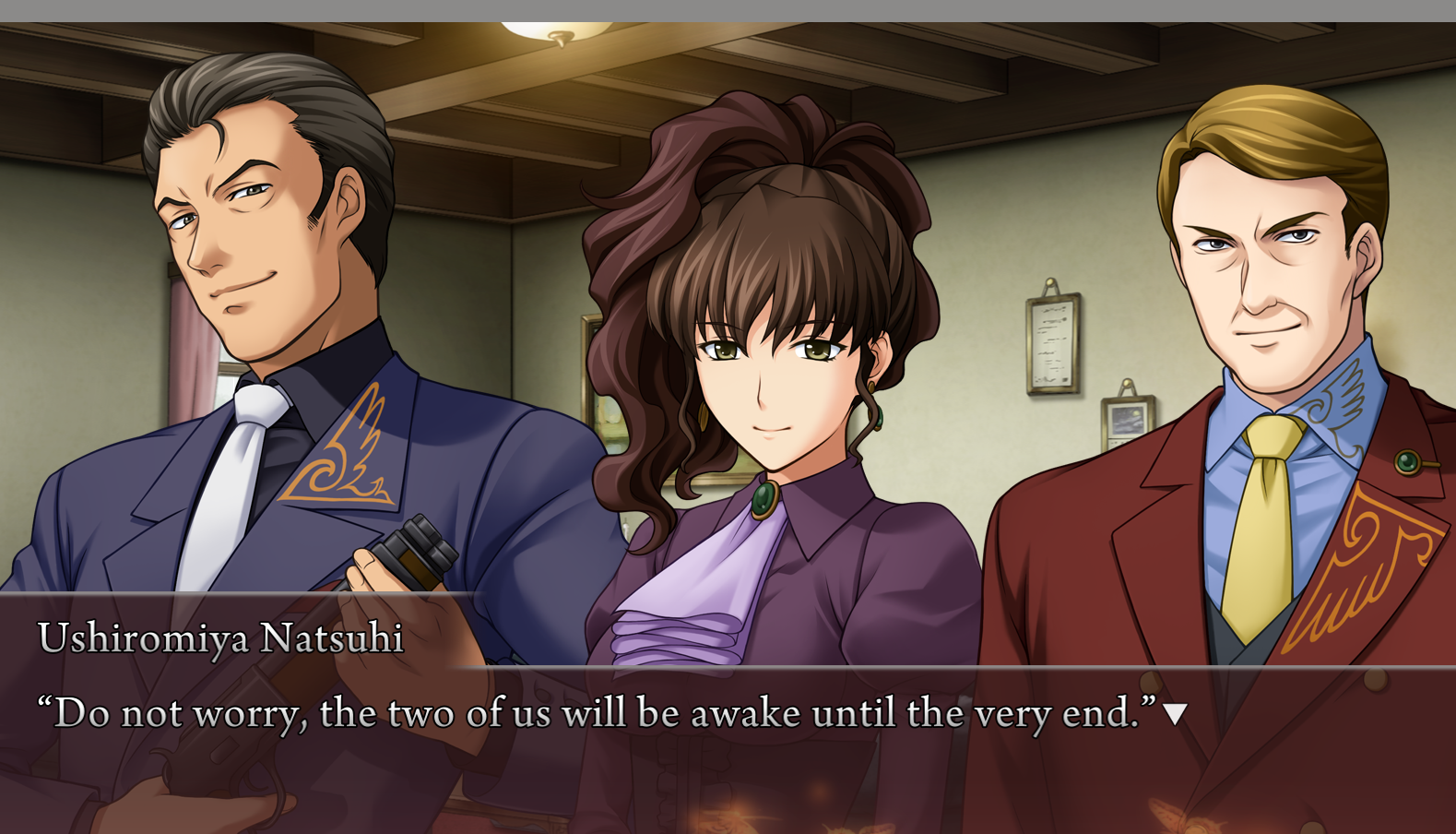
Hideyoshi notes that Eva seems to have a temperature, and the other siblings try to push her to go to Nanjo, or have a lie down. After some pressure—and a coded promise from Rosa that she won’t blab—Eva goes to lie down. Interestingly, she does not seem to have let Hideyoshi in on the secret either.
Shortly after Eva leaves, Maria and the kids come downstairs. Which is I suppose reassuring! Would hate to find out they’d died off camera, although Beatrice seems to be more about the on-camera showdowns these days, and who even knows what Eva Beatrice will do…
Anyway, Maria’s having a tantrum. As we’ve come to expect by now, Rosa responds sharply, with frustration. The cause seems to be a dream about her special rose in the rose garden. As Rosa raises her voice, everyone chimes in with parenting advice. Nanjo suggests warm milk, while Rudolf goes straight for a sedative. This is apparently not an outlandish suggestion, and Rosa starts looking for someone.
Cut to Eva, whose fever has gotten much worse! This is actually a new background, showing a different room of the guest house…
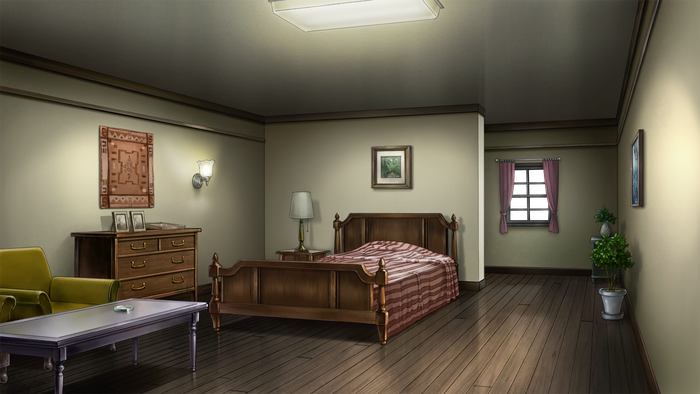
Hideyoshi is taking good care of her, talking about his ‘magic hand’ which takes away the pain. This is one thing I do appreciate a lot, actually—even characters who are often cruel will have a context in which they display this kind of tenderness. (Hideyoshi’s just a goofball regardless, but this episode seems to be about fleshing out Eva’s emotional range.)
Their conversation echoes others about magic. Even though Hideyoshi privately thinks he’s simply providing a placebo, he says that magic works if you believe in it…

Notable that here this is explicitly connected to religious belief. Eva meanwhile says that when she was young she used magic to get ahead: ‘if (she) wished strongly and tried hard, it came true every time.’ So for her, this ‘magic’ is kind of a ‘The Secret’ style of thing, power of suggestion.
It’s notable here that the idea of magic—or for that matter, religion—as something that only works if you believe in it is a distinctly modern attitude towards the subject. It is a question that only arises when faced with scientific epistemology and, in particular, a world of technologies that require no belief whatsoever. With science making a territorial claim over ‘what’ and ‘how’, magic has had to retreat to the domain of ‘why’. I am reminded of (drink) Baru Cormorant’s discussion of magic, discussed in this artice; the words of Ulyu Xe in particular.
Xe rolled onto her back and squirmed out of her skirtwrap. “When a witch raises a rabbit with the same name as a man, and kills and skins the rabbit, and then pisses through the rabbit’s skin into a pit of gravel, and the man gets kidney stones. The witch never touched the man. She never acted upon him. She only touched symbols of him.”
“Oh, fine.” Barhu crossed her arms and glared. “So magic doesn’t work except when it can be disguised as the coincidence of symbolic manipulation and natural occurrence? That’s very powerful.”
“The most powerful thing in the world,” Xe said, untying her strophium and sliding deeper into the water.
Magic here exists in the domain of narrative; extremely fitting for such a metafictional story. The strength of the magical ‘explanations’ of the events on Rokkenjima are not that they are especially parsimonious, or procede naturally from simple assumptions; it is that they make a good story, full of strong emotions and dramatic turns.
Does it mean then that to ‘believe in magic’ is to accept your role in a story? I’m not sure.
In any case, Eva continues, telling Hideyoshi about her alter though he does not much understand. She credits young!Eva with the good things in her life, even meeting Hideyoshi. But now she’s afraid that, provoked by Beatrice, the witch inside her is going to get stronger and stronger, and ‘swallow her up’…
Hideyoshi hears the ruckus with Maria, and goes outside to tell them to keep the noise down. So we see Rosa drag Maria to the lobby to take her away from Eva. This isn’t looking good! At this point, assuming the resurrection ritual continues on schedule from the second twilight, we have two candidates now for ‘the two who are close’.
The sad cello comes in as Maria attempts to convince Rosa to let her go see the rose. She very abruptly switches affect in the middle of the conversation, promising to behave if she just gets to go. Her voice actor does a good job portraying this sudden, eerie calm. She even mixes in the creepy laugh.
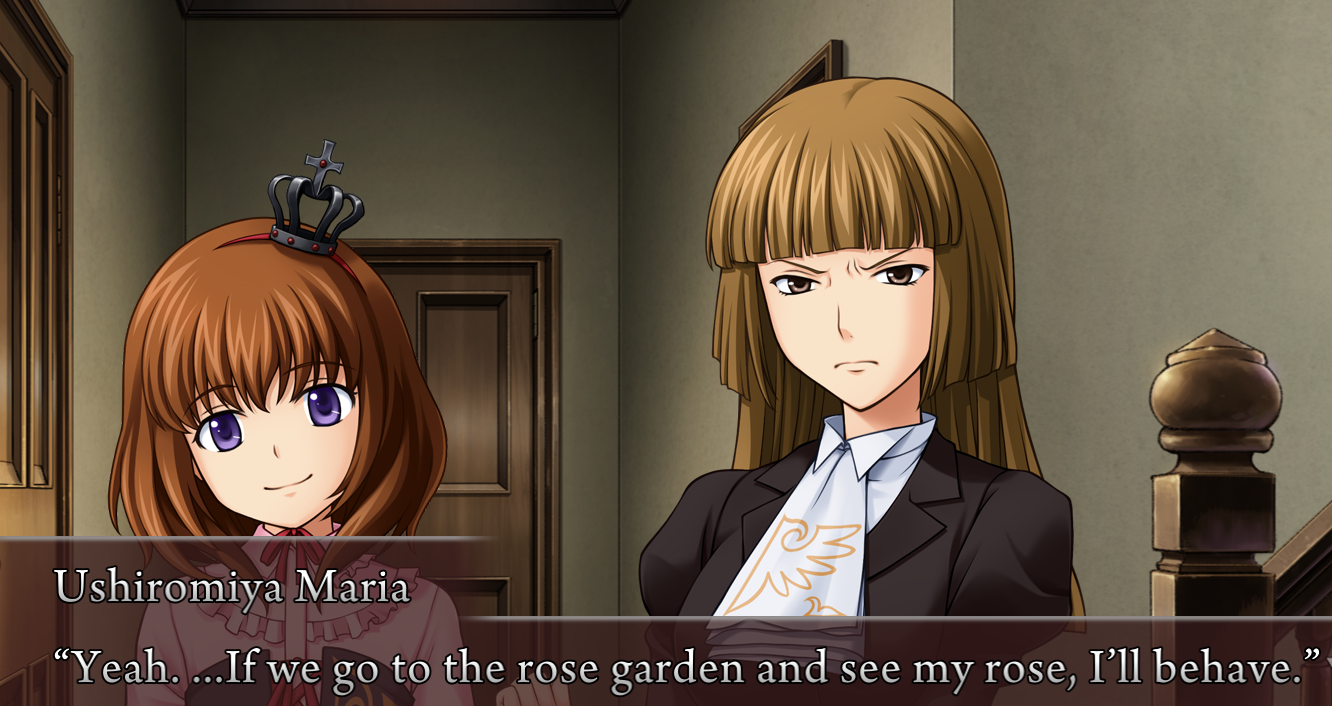
Rosa, who still believes the morning’s murders were fake because of the outlandish locked-room puzzle, reluctantly agrees.
Battler reaches the same conclusion as me, and panics, realising he is powerless to affect the narrative playing out. He shouts for someone to notice. Beato is here, and cackles about it in her inimitable way.
She raises the point that, per Battler’s hypothesis that the culprit in the first twilight died in an accident, there should be nobody left to do more murders. But as much as Battler’s role is to provide rational explanations, he can’t escape noticing the way the plot of these games always goes…
Sure enough, though Maria finds her rose, gold butterflies make their appearance. The manifestation of magic seems to correspond to Eva’s fever getting worse, and she begs Hideyoshi to hold tight with his maaaagic haaaandssss…
Out in the garden, another Eva appears before Rosa and Maria with an umbrella. Externally, this is adult Eva. But from her mannerisms, this is the younger alter speaking.
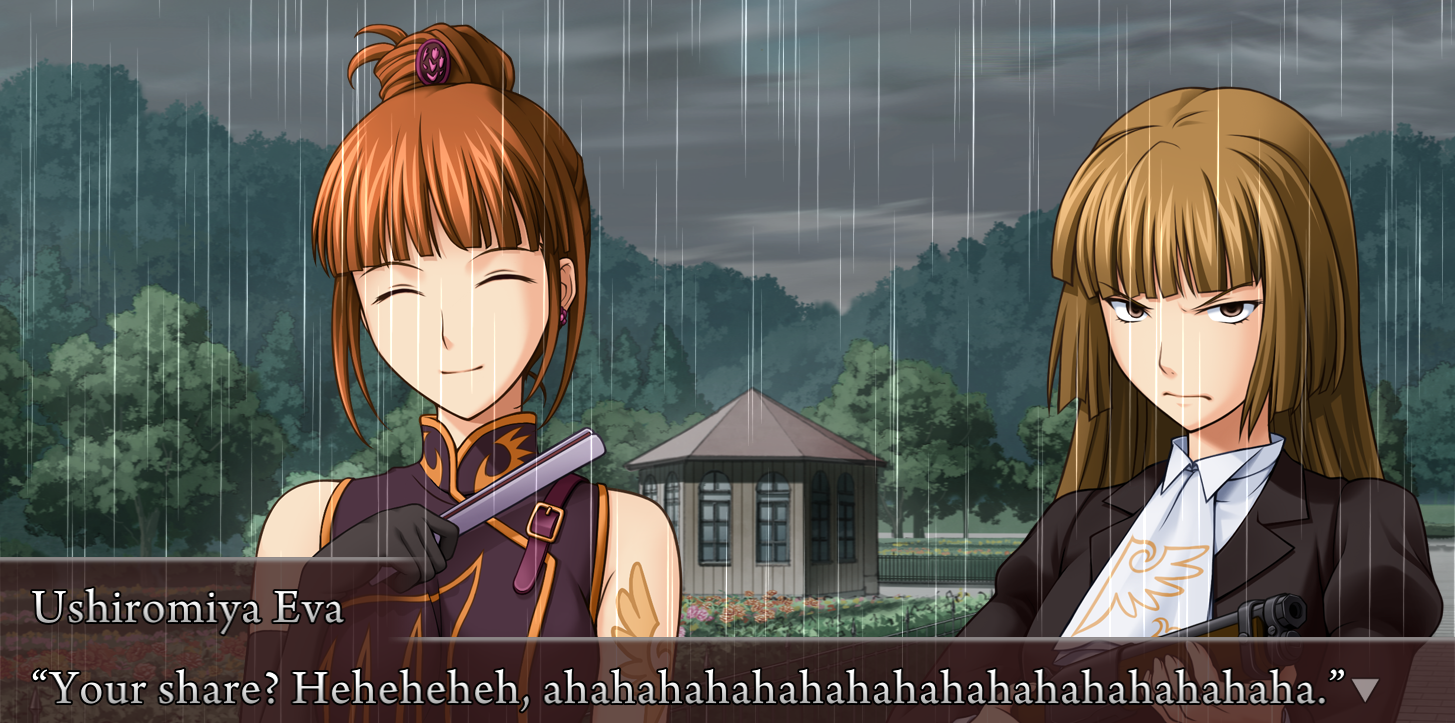
And then she deploys the worst weapon in her new Beatrice arsenal: an ahaha.wav!
At this point, Maria asks ‘who are you?’—still using the term of address for auntie, i.e. ‘obasan, dare?’. Eva just laughs. A quick cut to Eva screaming in her bed underlines the point: she is in both of these places. When we cut back, Eva Beatrice has assumed the more recognisable form, and she goes on a tirade against Rosa.
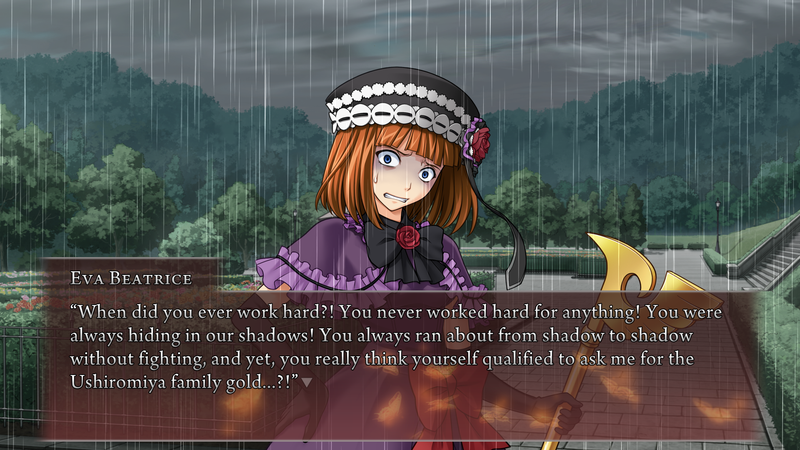
Interestingly, Maria recognises Eva Beatrice as Beatrice, and gets excited. Despite the fact that she looks completely different to the Beatrice that Maria had met earlier in the narrative!
Rosa points her gun, bringing with it a CG. She demands to know if Eva Beatrice is really Eva, and Eva Beatrice denies it, saying she is no longer Rosa’s sister. Surely not, says Rosa:
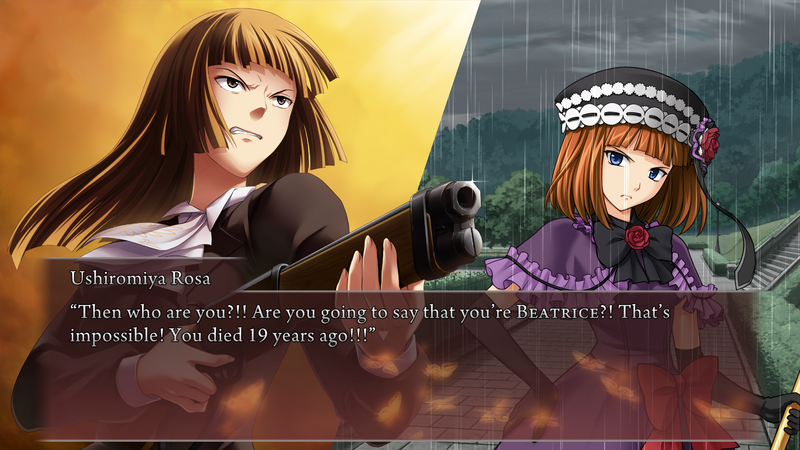
And in return, Eva Beatrice says something very interesting:
The concept of death does not exist for a Golden Witch. The names of the Golden Witch and Beatrice will be handed down for all eternity.
Which means… when we talk about Beatrice being a 1000-year-old witch, is it more that it’s a 1000-year-old inherited title!? Ironically, that’s a lot easier to accomodate in a non-magical worldview.
Eva Beatrice asks Ronove for advice, and he explains she can basically do anything now—so she decides to begin her course of sacrifices by slaughtering Rosa and Maria.
So time for some magic to go off! Bearing in mind the earlier moves in the game, we can definitely interpret this scene as Beatrice’s hypothesis if we want, rather than incontrovertible truth. Eva Beatrice’s ‘first wish’ is to be freed from gravity, so she raises herself and Rosa into the sky.
In keeping with her whole deal, Eva Beatrice’s approach to killing calls back to Eva’s childhood. It seems she once interrupted Rosa’s dream of flying, and now Eva Beatrice will make that dream last forever.
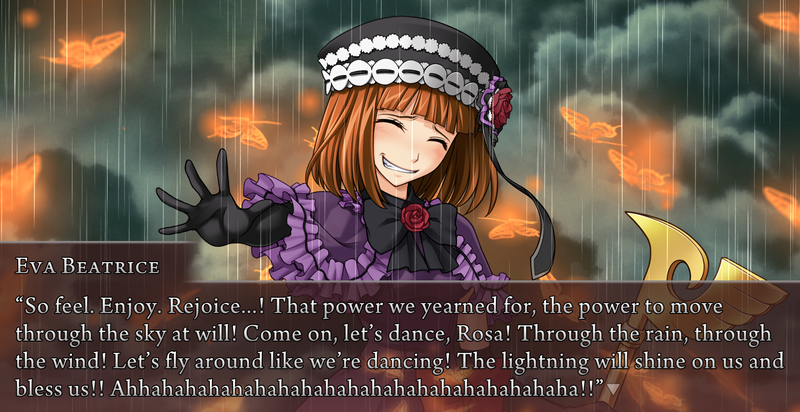
Eva accidentally drops the panicking Rosa rather than let her down gently, but she immediately finds the ability to invoke Endless Magic to bring her back. Ronove shows up to gas her up a bit. And EB very quickly concludes that if she can put anything back together, there’s no reason not to break it too—she won’t ‘get in trouble’.
She’s gonna fit right in.
Eva Beatrice immediately starts ramping the magic up some more, creating a full-on candy apocalypse: ocean of jelly and a rain of orange juice. This is conveyed by a series of hue filters over the ocean BG. Eva Beatrice dunks her in the jelly to a depth where she is crushed into a ‘meatball’ by the pressure, comprable to the Marianas Trench. Another resurrection, and Rosa gets crushed under a mountain of cake. The next death sees her transformed into a butterfly and killed in a spiderweb. But none of this wipes her memories, and Rosa is on her way to getting fully mindbroken.
Like the earlier magic battle, most of these showy effects seem to be taking place in some sort of pocket dimension—none of the orange juice rain or mountains of cake seem to be catching the attention of the other charactes indoors. The use of the spider’s web here is actually a little interesting, since previously a spider web was shown to be the ‘natural enemy’ of Beatrice. Eva Beatrice seems to have no such fear.
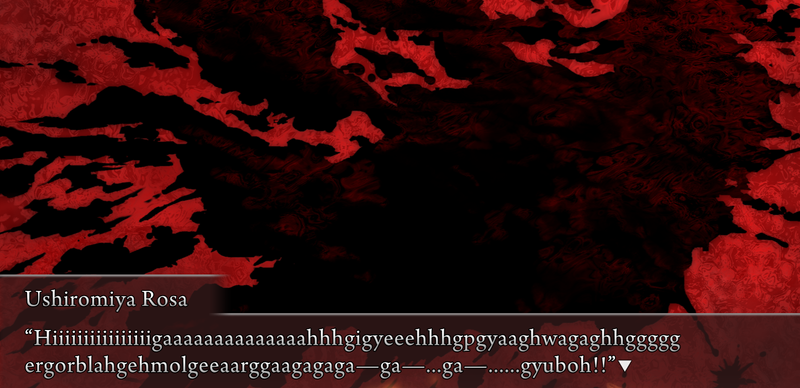
The onomatopoeia escalates until it’s basically a keysmash. Rosa’s VA does incredibly expressing this, honestly.
Back in Purgatorio, Beato finds this all very entertaining—she is impressed by how quickly Eva Beatrice picks up at-will magic. Battler on the other hand is not enjoying this whole guro thing and we get the crying Battler sprite for the first time in this episode.
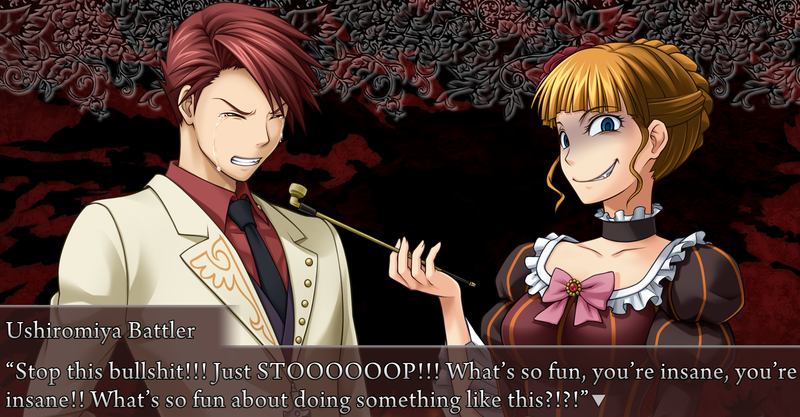
Beato takes this opportunity to evangelise the joys of magic, promising to teach Battler magic if he would just accept her. Despite the ahaha.wavs here, this is less gloating laughter—she seems to genuinely not see why Battler wouldn’t see this as a joyful fun experience. Indeed, this is spelled out explicitly by the narration.
As Battler challenges her, Beato denies that this is her doing, and says it’s the new Beatrice. Is Eva Beatrice about to show up in Purgatorio, I wonder..?
At this point Battler slaps her! Guess you can physically lay hands on a witch. This seems pretty minor compared to all the times Beato has disintegrated Battler’s body, but there’s a lot of symbolic power in a slap as I’m sure you know. Battler furiously tells Beatrice to never show herself in front of him again - to ‘just FUCK OOOOOOOOOOOOOOOOOOFFF!!!’
And then something crazy happens. Battler does magic.
Remember when we saw that flash of the red protection symbol? That happens again, for longer this time, about a second. Beato is knocked flat. In a magical world where emotions have power, I suppose that absolute rejection would maniefist this way, huh?
Remarkably, Beato responds not with anger, but trying to make excuses.
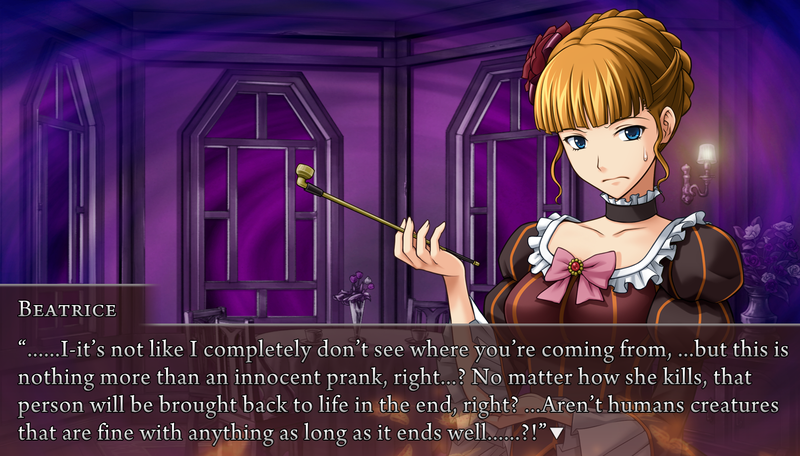
She turns to Virgilia, who also decides to stop existing for a bit until all the body smashing is over. Beato is left alone, still trying to justify herself. Hey, I feel you Beatrice. Sometimes you’re into messed up shit and it’s hard to put the reasons into words.
Ronove is still here in Purgatorio despite being assigned to Eva Beatrice in the narrative. So Beato gets to confide in him. She seems genuinely put out that Battler hates her so much—such an about face. In fact, she actually starts to cry!
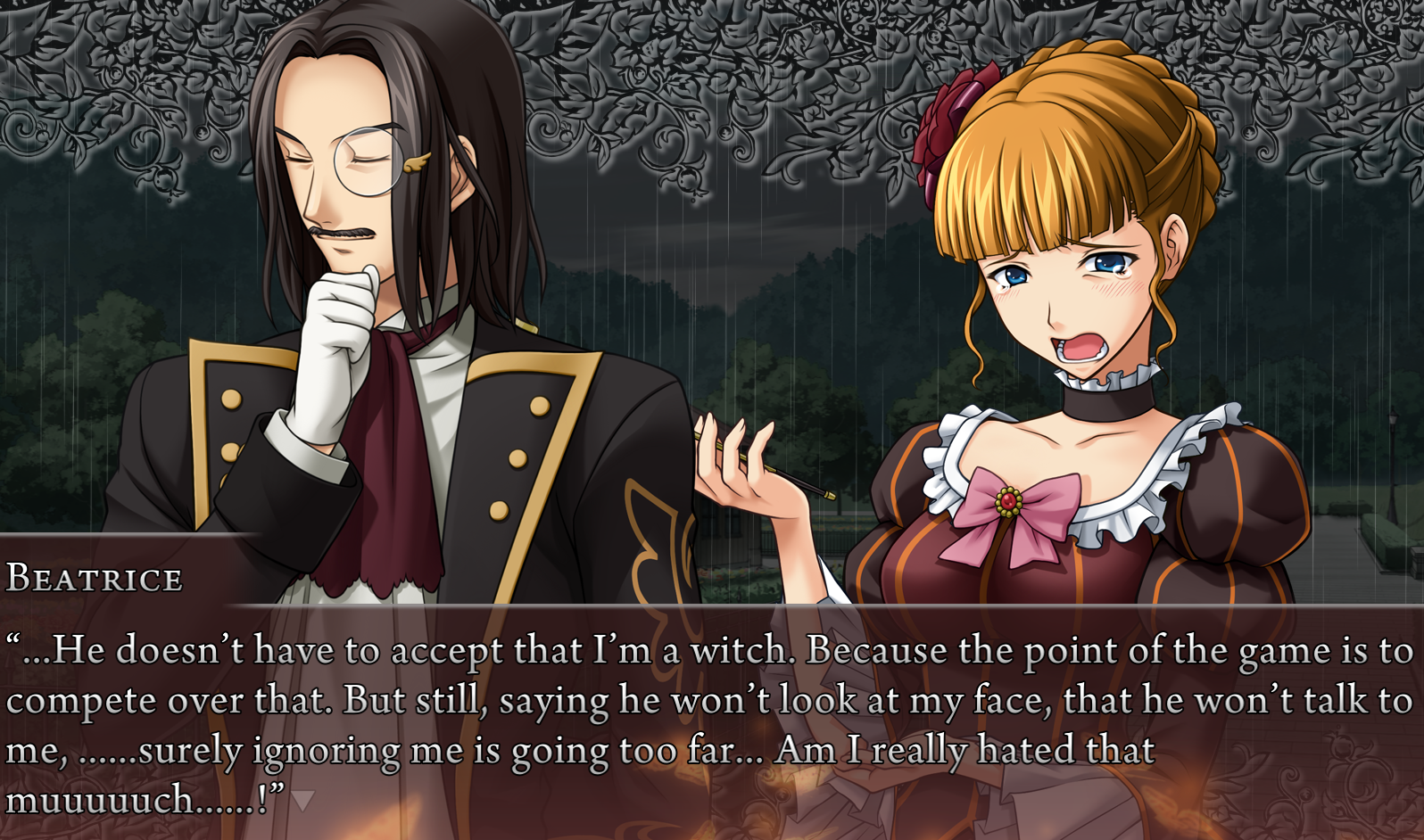
Honestly, for all that I’ve joked about Beato being totally horny over Battler kissing her feet and stuff, I wasn’t really expecting a full-on romance subplot! What do ya know! It’s just the look in his eyes when he says ‘dame da, zenzen dame da…’ That muscular chessboard flip…
Honestly, the way she’s acting here, it’s kind of clear that ‘1000 year old witch’ or not, Beato seems to be emotionally pretty much a teenager. Given that we have now observed that witches seem to be stuck in whatever stage of development they are when they ascend, this doesn’t seem too surprising. Beato, it increasingly seems, is still fundamentally the young woman in the garden at Kuwadorian, who received the name and powers of the Endless Witch and let it go to her head.
Anyway, she gets no sympathy from Ronove, who calls her a dumbass and leaves.
So, since Beato alone seems to be able to cross between the narrative and Purgatorio dimensions, she goes out to speak to Eva Beatrice and ask her to stop!
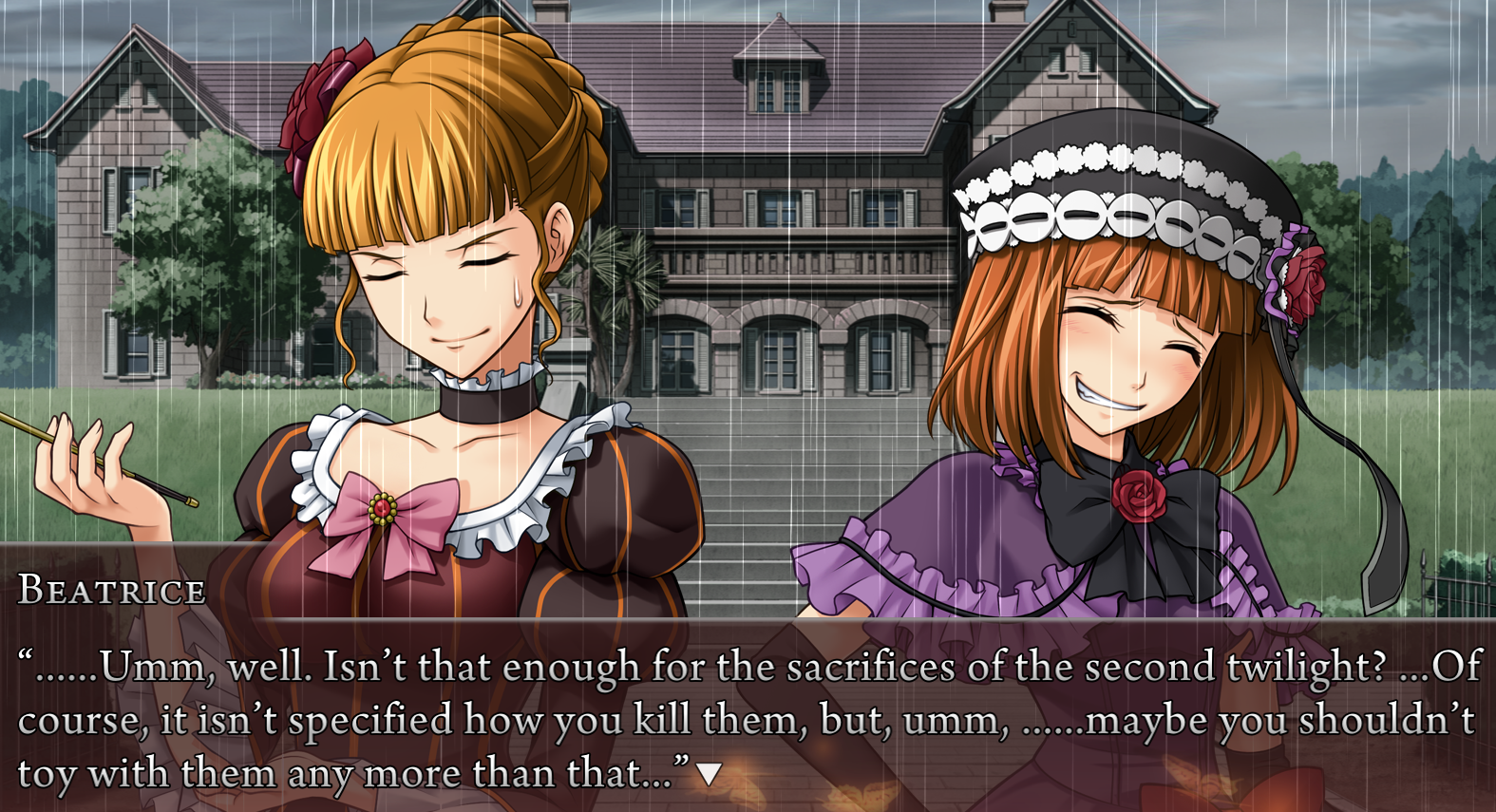
Eva Beatrice of course isn’t going to be persuaded so easily. “I wonder if I can be cruel in my own pop, cute, style?!” she says—we can perhaps trace the artistic lineages of murder witches.
Beato makes some weaksauce attempts to persuade—but “I might have gone too far” is honestly a pretty big step for her! She appeals to elegance…
She demands to step in and show the newbie how it’s done. She resurrects Rosa and Maria in a ‘gentler’ way than prior, confirming that Beato still has Endless powers, even if she doesn’t hold the Golden Witch title anymore. And actually apologises(!!) to Rosa and Maria. Now there’s a beat I wasn’t expecting anytime soon.
A lot to impress a boy, huh.
Maria leaps on her for protection, reminding her of the Golden Land promise. Beato once again confirms she’s out of the running here, and can’t save Maria any longer. Which, if cruelty was the goal, is actually pretty needle sharp. Bringing her back just to break that promise! As a way of apology, she quickly breaks Maria’s neck in front of Rosa, and then wafts Rosa over to get skewered on the garden fence. (Gideon style.)
The medulla oblongata comes back again!! I’ve missed that guy.
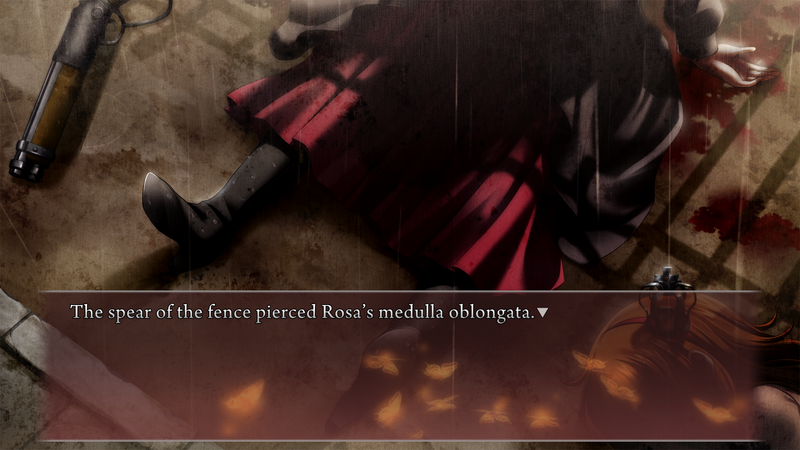
“………W-…well, that’s pretty much how you do it.” says Beatrice, which has to be one of the funniest lines in this whole episode.
She scolds Eva Beatrice and tells her to follow orders until her resurrection, despite proving herself to be a total stick in the mud in her eyes it seems. What a great dynamic omfg.
She summons Ronove and Lucifer, and rather awkwardly stammers out an order to be graceful and quick in the subsequent killings. Ronove happily promises to be on his best behaviour. Then, unable to continue, Beato ducks out and Eva Beatrice essentially calls her a square.
This is so fucking funny wtf. That’s the end of the chapter. Goddamn what a ride.
So… Umineko’s back. I can’t wait to see where it goes next. Welcome back, everyone! Our next few episodes probably won’t be this epic, but I wanted to start out strong with a nice entire chapter. And phew, what a chapter—safe to say this changes everything. See you soon for more~
Comments